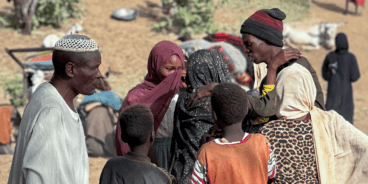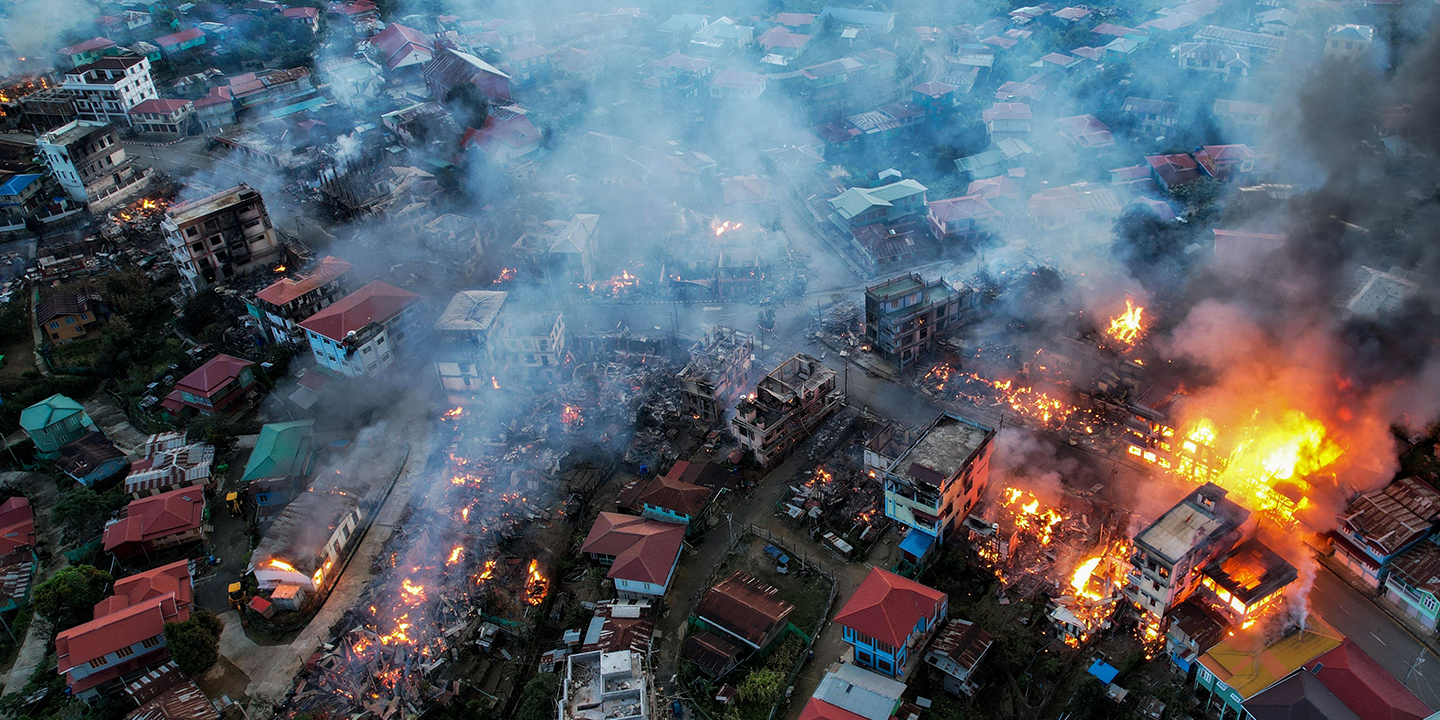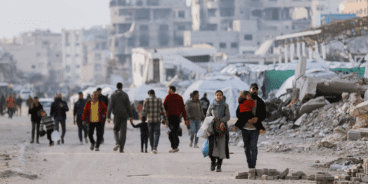

Atrocity Alert No. 380: Myanmar (Burma), ICJ Provisional Measures and Ethiopia
Atrocity Alert is a weekly publication by the Global Centre for the Responsibility to Protect highlighting situations where populations are at risk of, or are enduring, mass atrocity crimes.
THREE YEARS OF POST-COUP ATROCITIES IN MYANMAR
Tomorrow, 1 February, marks three years since the military in Myanmar (Burma) overthrew the civilian-led government. Since then, the people of Myanmar have endured war crimes and crimes against humanity as the military has imposed crackdowns on anti-coup protests and perpetrated an increasingly violent campaign in anti-junta strongholds across the country. The military has perpetrated mass detentions, indiscriminate bombardments and arson campaigns, targeted attacks on schools and religious buildings, rape and the weaponization of vital humanitarian aid. Since the coup, at least 4,400 people have been killed, including 1,600 in 2023 alone, and 2.6 million displaced while nearly 20,000 people remain detained.
In October a group of ethnic revolutionary organizations – known as the Three Brotherhood Alliance – launched Operation 1027, targeting the junta’s outposts and strongholds across the country. Operation 1027 – the most significant challenge to the junta since the coup – has galvanized other armed groups to launch attacks, with fighting now engulfing two thirds of the country. Fighting has particularly intensified in Rakhine State, where clashes on 26 January between the Arakan Army and the military in Hpon Nyo Leik village killed at least 12 Rohingya civilians. The military repeatedly shelled the village, destroying infrastructure. According to the Office of the UN High Commissioner for Human Rights, the Arakan Army allegedly positioned its troops in and around this Rohingya village in anticipation of the military’s attacks. Since October, at least 554 people have been killed and 800,000 newly displaced.
On 30 January the UN High Commissioner for Human Rights, Volker Türk, warned, “As the military have suffered setback after setback on the battlefield, they have lashed out, launching waves of indiscriminate aerial bombardments and artillery strikes… Military tactics have consistently focused on the punishment of civilians who they view as supporting their enemies. As a result, the military has routinely targeted civilians and protected objects under international humanitarian law, especially medical facilities and schools.” Targeted attacks on civilians and civilian objects, the use of human shields and the indiscriminate bombardments of civilian-populated areas violate international humanitarian and human rights law and may amount to war crimes and crimes against humanity.
Three years into the crisis, both the Association of Southeast Asian Nations and the UN Security Council are paralyzed by divisions and have made little progress on a coordinated response as civilians continue to endure atrocities. The Executive Director of the Global Centre for the Responsibility to Protect, Savita Pawnday, said, “In the three years since the military coup, populations across Myanmar have suffered from atrocities and daily abuses at the hands of the military who have been emboldened by impunity. The international community must collectively cut off the junta’s access to the jet fuel, funds and the legitimacy it needs to continue committing atrocities against civilians.”
ICJ ORDERS ISRAEL TO PREVENT ACTS OF GENOCIDE
On 26 January the International Court of Justice (ICJ) ordered provisional measures in the case brought by South Africa concerning alleged violations of Israel’s obligations under the Convention on the Prevention and Punishment of the Crime of Genocide regarding Palestinians in Gaza. The ICJ’s provisional measures called on Israel to: take all possible measures to prevent the commission of acts under the Genocide Convention and ensure the military does not commit any of these acts; prevent and punish the direct and public incitement to genocide; and take immediate and effective measures to enable the provision of humanitarian aid to Palestinians in Gaza. Notably, the ICJ also ordered Israel to preserve evidence of genocide and to submit a report, within one month, of all measures taken to comply with the order.
South Africa’s application alleged that “Israel has engaged in, is engaging in and risks further engaging in genocidal acts against the Palestinian people in Gaza” and contained a request for the indication of provisional measures. Public hearings to consider this request were held on 11 and 12 January. Provisional measures issued by the ICJ intend to provide urgently needed protective or injunctive relief pending a decision on a dispute, which may take years to resolve.
In its order, the ICJ stated it was “acutely aware” of the unfolding tragedy in Gaza and expressed concern about the continuing loss of life and human suffering. The Court highlighted that over 25,000 Palestinians have been killed and 1.7 million internally displaced since 7 October, while displacement shelters are severely overcrowded and a public health disaster unfolds across Gaza, characterized by the risk of famine and spread of infectious disease. The Court emphasized that this catastrophic situation is at serious risk of deteriorating further, concluding that “there is a real and imminent risk” that irreparable harm could be caused to the rights of Palestinians, which must be protected from acts of genocide. The ICJ determined that the steps Israel has purportedly taken to alleviate conditions in Gaza are insufficient to remove such risk. Though not one of the provisional measures ordered by the Court, the ICJ also emphasized that Hamas and other Palestinian armed groups should immediately and unconditionally release all hostages.
UN Secretary-General António Guterres emphasized that “decisions of the Court are binding” and that he “trusts that all parties will duly comply with the Order from the Court.” Israel must urgently comply with the provisional measures, including by lifting the siege on Gaza. Other states parties to the Genocide Convention, regardless of their political positioning, must fulfill their duty to ensure the provisional measures are implemented effectively. All military operations in Gaza must cease.
GENUINE ACCOUNTABILITY NEEDED FOR ATROCITIES IN ETHIOPIA AS ABUSES CONTINUE
Despite the November 2022 ceasefire, populations in northern Ethiopia continue to endure the residual impacts of the two-year conflict in the region. Aid workers have warned of a potential catastrophic breakdown if humanitarian assistance is not urgently increased. Following a six-month suspension of programs run by the World Food Programme (WFP) and USAID due to evidence of widespread aid diversion by parties to the conflict, humanitarian assistance resumed in northern Ethiopia in December 2023. However, as of 21 January, only 14 percent of the 3.2 million who need aid in Tigray have received assistance, according to the Tigray Food Cluster, a group of aid agencies that includes the WFP. Hundreds of people have reportedly starved to death over the past year, while more than 1 million internally displaced persons continue to rely on assistance in host communities, camps and schools.
Meanwhile, in the neighboring Amhara region, the situation remains critical as conflict continues between the ethnic Amhara fano militia and federal forces. Since fighting broke out in April 2023, scores of civilians have been killed by air and drone strikes, with such attacks intensifying between September and December. On 10 December between 30-40 people were killed in Amahara’s Sayint district. Ethiopian federal forces have also arrested, extrajudicially killed and summarily executed Amhara civilians in their search for fano supporters. Indiscriminate attacks on civilians, as well as targeting civilians based on their identity, are prohibited under international law and may amount to war crimes and crimes against humanity.
Successive failures in holding the federal government accountable for atrocities has proliferated ongoing abuses. On 28 December the Office of the UN High Commissioner for Human Rights and the Ethiopian Human Rights Commission released the outcomes of community consultations across numerous regions on transitional justice and accountability. The report’s findings indicate consensus among participants, including victims of the conflicts across the country, that for Ethiopia to break the cycle of violence and impunity, it is essential that ongoing transitional justice processes entail criminal accountability. The participants also called for other elements of transitional justice to be implemented equally, including truth-seeking, reparations, guarantees of non-recurrence, legal reforms and reparations.
Sarah Hunter, the Global Centre for the Responsibility to Protect’s Ethiopia expert, said, “While the international community is eager to return to business as usual with Ethiopia, we continue to call for an international, independent accountability process centered around the needs of victims and survivors, to bring an end to these cycles of violence.” The international community should also provide increased support and resources to the humanitarian response in Ethiopia.
Related Content


Atrocity Alert No. 434: Sudan, Ethiopia and the UN Human Rights Council
